 
|
||||
|
|
JAN
LINTON |
|||
|
mwe3.com presents an interview with JAN LINTON  mwe3: Where
are you from originally and where do you live now? How did you end up
living in Hong Kong and what’s the music scene there like? What
inspired you to leave England and where did you live in England? How
long have you been in Hong Kong? mwe3: Where
are you from originally and where do you live now? How did you end up
living in Hong Kong and what’s the music scene there like? What
inspired you to leave England and where did you live in England? How
long have you been in Hong Kong? Jan Linton: I had been based in Japan before 2005 but then returned to the UK to do a Masters degree in music/video technology. I returned to Japan a couple of years later but it wasn’t the same as it once was, and the 2008 recession damaged the music industry there. From 2009 onwards I was thinking about moving to Hong Kong, which I had briefly visited in 2007, and after touring Shanghai in 2010 and getting an enthusiastic reception, I felt it was time to move on. mwe3: How did I Actually Come Back come together as an album and what inspired pairing the album with a second mini album called Buddha Machine Music, and which was recorded and released first? Jan Linton: It started as an EP or single, really just a couple of songs I had collaborated on with Leo Abrahams. The whole album represents my output and work inspired by him since I met him a decade ago. It has been a very slow process with a lot of updates. I tend to work quite slowly, a year seems a short time for me, but Leo is far more prolific and hard working. I remember at one point he was taken aback as to why I would want to revisit "Anemone", a track of his from 2006 album Scene Memory, but I felt these songs were precious… I wanted to preserve them and give them further attention. I had already done a version of his track "Anemone" in 2006, which I extended, played keyboards on, and added vocals. This newer version on the album features a drum machine and a new vocal. In return, Leo had played guitar on my song "The Kindness Of Strangers", and for several years I tried to get record companies interested in just these two songs, but they always said it should be a full-length album, not an EP. So it grew into a mini album, which was tentatively released as a stand-alone mini album of ten tracks at the end of 2015, but due to Leo's busy schedule he hadn't played on all of the songs at that point. So, this new release is radically different, with a total of 12 different or re-recorded songs, and Leo plays on every track. A couple of older songs from the first release that he didn't play on are omitted. The total writing and planning period spans a decade! I see it as the record of this period. Buddha Machine Music was released in 2011, but as Entropy Records more recently decided to cease trading, the remaining 300 copies were combined with the new release of "I Actually Come Back" as a limited edition, two disc package. Subsequent copies are just the single album, without Buddha Machine Music. mwe3: Because all the tracks on Buddha Machine Music have Chinese names was it somehow influenced by Chinese music, art or culture? Is there an avant gard and electronic music scene in China? What instruments did you record the BMM album with? Why a mini disc? I was so happy to find out it plays well on my vintage CD players. Where was the CD pressed? Who else plays on Buddha Machine Music?  Jan Linton:
The Buddha Machine is a loop playback device first released by the Chinese
based avant garde group FM3, based on Buddhist prayer boxes which play
recordings of religious chants. It is basically a speaker in a plastic
box, but FM3 put their own loops in it and added a pitch bend to it.
It immediately became successful and apparently Brian Eno bought twenty
of the things; presumably as interested in its generative, loop based,
qualities. Jan Linton:
The Buddha Machine is a loop playback device first released by the Chinese
based avant garde group FM3, based on Buddhist prayer boxes which play
recordings of religious chants. It is basically a speaker in a plastic
box, but FM3 put their own loops in it and added a pitch bend to it.
It immediately became successful and apparently Brian Eno bought twenty
of the things; presumably as interested in its generative, loop based,
qualities. Shortly after, I had read an article in Time or Newsweek about China's underground, centered on Beijing punk clubs like D22, and then I read about FM3 as I was just starting my Master's degree in Creative Music Technology. I had just moved back to the UK from Japan, which was getting a bit stagnant, and I was looking for something new and innovative. So I started to get interested in China as a fresh musical alternative to Japan which by then had become over rationalized as well as cliquey, but also in the middle of a severe recession, as I said. I finally played a four gig tour in the Shanghai area in 2010, and venues were more definitely more open minded than the ones in Japan, where you basically have to pay to rent out the space. So then my next move was to remix some loops from FM3’s first two Buddha Machines, and these became the tracks " Shenxiaozhong" and "Yang (Infinite Delay)". The Chinese names are mainly combinations of the original titles of the loops on the Buddha Machine player. I played guitar on the former, so it started to become more than just a remix. I sent them to Christiaan Virant, who is one of the members of FM3, and he liked them but nothing further happened until Entropy Records said they wanted to put out a mini album of my compositions using the Buddha Machine sounds. So I had to come up with a further four pieces, which moved further away from being just remixes and were like new instrumental compositions, but still containing the Buddha Machine loops- sometimes heavily treated with effects. I played a Chinese lute-type instrument, the Zhongruan, which I had picked up in Beijing on an earlier trip, on two of these pieces. I was working alone for the majority of the project. mwe3: First I was thinking the song “I Actually Come Back” was inspired by reincarnation but then I read the lyrics and felt it was about resolving a broken love relationship? Jan Linton: "I Actually Come back" is a lyric that came to me in a dream, it is a promise to return. You are not the first person to mention reincarnation and there is an element of avoiding death in the song, but it was actually about my unexpected return trips to Japan after I had left in 2005. I kept coming back to the place over a two year period, but people were reacting a bit negatively, like "We thought you had left for good". I couldn't quite get the place out of my system at that point, and I ended up moving back there in 2007! 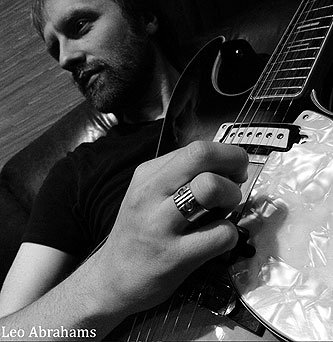 mwe3:
Leo Abrahams plays on I Actually Come Back. How did you meet
Leo and can you tell us something about Leo’s contributions to
the album? mwe3:
Leo Abrahams plays on I Actually Come Back. How did you meet
Leo and can you tell us something about Leo’s contributions to
the album?Jan Linton: I first met Leo when he played a gig at a pub in Bath in 2006, when I was a student at the university there. It was quite fortuitous as I had seriously considered exiting the course just before that! He and his friend jumped in a taxi and came to see my home studio, and he played with my amusing and somewhat toy like Casio digital guitar, which he said Brian Eno also had in his studio! Leo gave me copies of his first two albums, and I was especially taken by the more ambient one, Scene Memory. On that album, "Anemone" really sounded like a song without words, and I quickly came up with lyrics and a vocal melody, and played an ebow guitar solo in the middle. Leo's record company released it as a download shortly after, and I was really taken by his open-mindedness and willingness to experiment. It was so inspiring after what I had experienced before. As I mentioned earlier, Leo then played guitar on my song "The Kindness Of Strangers", which I had originally recorded from the sessions of a Japanese major record company, but its gentle sound didn't fit the "cyber punk" style of the album that resulted, Planet Japan (King Records). I wanted to release these songs on a physical CD, not just a download that might get lost in cyberspace, so I needed more songs. Like I said, it started as an EP so I did two remixes/edits of "The Kindness Of Strangers", an overture and a reprise. Unfortunately, Leo's schedule at the time in 2015 meant he couldn't play on any further pieces, but I had already committed to releasing a CD. So the first pressing was somewhat misleading as it was credited with Leo Abrahams, and two of the tracks were his recordings, but there were some tracks he hadn't been involved with. So last year I decided to fix that with an improved version of the album and by then Leo's schedule had freed up, so he kindly agreed to overdub the main melody of the title song "I Actually Come Back", and a bit later played guitar solos which appeared in "Emancipate Your Heart", new track "Cocteau Sublime", and new song "Joy". mwe3: Is the song “Joy” a good example of how well you play and record with Leo Abrahams? Is “Joy” a contrast of your life in the UK with your newly adopted home in Hong Kong? How has England changed for you? The song speaks of working in a foreign land and how “my home used to be there”. Jan Linton: "Joy" is a very important song for me, in some ways the cornerstone of this record. It is another dream song, as the lyrics are taken directly from a dream I had; I woke up and immediately recorded the idea on a keyboard. It is actually about South East Asian migrant workers, many of whom work in Hong Kong, but who in the dream and the song also may work in Europe. Whereas "Anemone" and "Birds in the Dream Forest/Route 2" are more collaborative in that they were Leo’s compositions which I added significantly to, "Joy" was more a case of Leo adding a very tasteful guitar solo, but I think this really brings a whiff of class to the track. It is always my favorite part of this version, and I sometimes fast forward to the beginning of his solo; it really gives me shivers down the spine to hear it. This is, by the way, not the full-length version of the song; a final, "religious" verse exists, which I hope to include on my next album, tentatively titled Dreamsongs (and more). 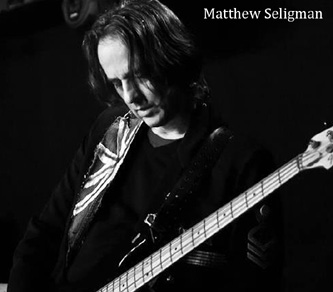 mwe3:
Working with Leo Abrahams it’s assumed you’re an Eno fan and
a Bowie fan. I also found out I Actually Come Back also features
a guest appearance by Matthew Seligman, who played bass with David Bowie
on the “Absolute Beginners” song, maybe Bowie’s best
song of the 1980s. How did you meet Matthew? mwe3:
Working with Leo Abrahams it’s assumed you’re an Eno fan and
a Bowie fan. I also found out I Actually Come Back also features
a guest appearance by Matthew Seligman, who played bass with David Bowie
on the “Absolute Beginners” song, maybe Bowie’s best
song of the 1980s. How did you meet Matthew?Jan Linton: As a teenager I remember listening to Eno's ambient albums like On Land in the industrial north west of England in the late 1980s when and where it was incredibly unfashionable to do so. What was more, it was just not done and was not socially acceptable, so it was just written off and ignored as "weirdo music". Rick Astley and Kylie Minogue were popular at the time, and I was like an alien to the locals, even though I was born there. Ironically, my cousin who is a successful sound engineer later worked extensively with Kylie, she even came to her wedding! I then moved to London, in pursuit of my dreams, but "Soul to Soul" and stuff like that was in ascendence there; the London was too "urban" and threatening for a sheltered, country boy like me. In 1987 I had heard the album by The Dolphin Brothers, who were ex-members of the group Japan, which offered a glimmer of hope to me. A certain Matthew Seligman was one of the bass players credited on the album. I had joined the musicians union and his contact details were in their directory, and I distinctively remember calling him up from a public phone box near Kings Cross, during my lunch break. It was an odd exchange and Matthew later said he has no recollection of this conversation! I hope he doesn't mind me retelling it in this interview. I started by apologizing for calling him out of the blue but he kindly replied "You are using a modern device to communicate, its OK!" so I then asked him if he was still playing and open to sessions but he replied that by this time he had sort of left the music business and was writing a book about the brother of Jesus. And so that was that….until 2011, when the big Tohoku earthquake and nuclear disaster happened in Japan, and by chance I read online that he had married a Japanese and was living in Tohoku! I immediately tracked him down and got in contact again, as I was very concerned about the plight of the residents there; it had been my favorite city and I had visited there a dozen times or so. It turned out he and his family had got out OK, and he was later returning to Sendai city, via Hong Kong as coincidence, or destiny again, would have it, so I ended up finally meeting him at a gig we played together in Hong Kong straight after him getting off the plane from London! Bowie's Live Aid clip is good as he introduces Matthew Seligman by name but they don't play "Absolute Beginners". The first time Matthew ever played "Absolute Beginners" live, was with me, in Hong Kong in 2012. Even though he composed his bassline to the song. 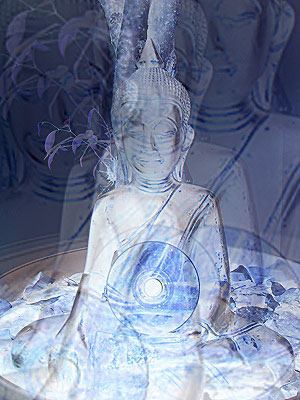 mwe3:
“The Kindness Of Strangers” features some excellent guitar
work on it. Is that the kind of song you like to write about somber
tales of lost love? It’s amazing how broken relationships are like
ghosts that visit us from time to time. mwe3:
“The Kindness Of Strangers” features some excellent guitar
work on it. Is that the kind of song you like to write about somber
tales of lost love? It’s amazing how broken relationships are like
ghosts that visit us from time to time.Jan Linton: As I mentioned, this had originally been recorded for the Planet Japan album released by Japanese major King Records, but it didn’t really fit in with that. I rerecorded a lot of it, but the live drummer from that album remains on the track. I kept working on it, and various guitar players added their parts over the years, including the charismatic and wonderfully talented Kenichi Kurosawa, best known from the successful Japanese pop group L_R. He is mostly playing rhythm guitar throughout the track. He sometimes reminds me of the lead singer of A-ha, Morten Harket, in photographs. I am sad to say that he passed away at the age of just 48, on December 5th, 2016. So this is almost certainly one of the last CDs to be released that will ever feature his playing. The record company pressed this album shortly after that and it was too late to add any dedication to him, but I definitely will do so for the next pressing. I am trying to get in touch with his management without much luck. It is quite an awkward topic but I have several unreleased tracks with his guitar playing from when I was studying the masters degree, but I certainly do not want to cash in on this. To further answer your question, I think the meaning of the song is quite apparent; it is about how someone went to Australia and got pregnant there, presumably married the father and completely disappeared; “Now she’s the stranger to me”. I think it is also a song about the death of love, or the death of my belief in naïve, unrealistic romantic love conquering all. It was like a part of me, perhaps the last part of my teenage ideas of love was dying, as there is that despairing refrain, “and she went and changed and changed and changed”. But people change, you don’t need me to tell you that. mwe3: Tell us about your choice of instruments on I Actually Come Back? What are your favorite guitars and keyboards? Also how has your choice of guitars and keyboards changed over the years? Are there some guitar makers in Hong Kong? Jan Linton: I actually bought a local fretless guitar, not a bass, which I played on "Joy", which was made by a local Hong Kong guitar maker called Rosealan, who is literally down the street from my studio. His company makes really unusual double headed guitars, or combinations of fretted and fretless instruments, presumably so you can switch between the two styles of playing live. He had also made a couple of extremely long double basses but they look like rock guitars. This album's instrumentation differs from earlier ones for a practical reason as a lot of my usual instruments were, and still are, in storage in my former regular studio, in Yokohama, Japan. The Roland Juno 2 synth, which I have been using on all my albums up to 2011 or so, and which has an atmospheric signature sound of mine does not appear on the newer tracks. It’s probably somewhere in the mix of “Anemone”. I went and brought back a couple of keyboards from Japan in early 2016 and one of them was the Roland Saturn organ synth that I used on the Buddha Machine Music track, "B2 Dance (Wu Song)"- a favorite track of Christiaan Virant's. And that is the same organ sound I play in the chorus of "Joy", so there is some continuity. The other synthesizer I almost always use is the Microkorg, and that replaced some parts I had previously played on the Roland Juno, notably on "Birds In The Dream Forest". However, yet another Roland synth I have in Japan, the 106 does appear on the various "Kindness" remixes, as I had recorded these parts much earlier, ditto with "Anemone". 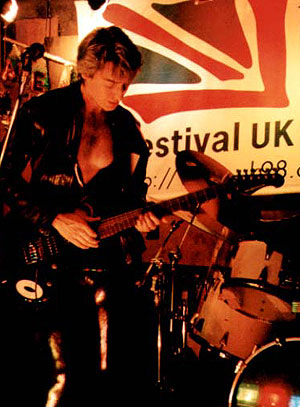 The
guitar sound playing the melody on the title track of the album actually
was not a guitar at all, its on a Roland JV2080 synth I bought in Hong
Kong, to kind of make up for the old instruments I was missing in Japan.
It is really good for realistic, classy sounds and that convinced me
to base the album around the song "I Actually Come Back" because
before that I was playing the melody on an old analog synth and it sounded
quite cheesy to my ears, a bit like early Depeche Mode's monophonic
synth lines. I didn't want it to sound like an obvious synthpop track,
and the sound I used from the JV2080 suggested a guitar, so Leo later
overdubbed the exact melody, with some harmonic parts at the song's
close. The
guitar sound playing the melody on the title track of the album actually
was not a guitar at all, its on a Roland JV2080 synth I bought in Hong
Kong, to kind of make up for the old instruments I was missing in Japan.
It is really good for realistic, classy sounds and that convinced me
to base the album around the song "I Actually Come Back" because
before that I was playing the melody on an old analog synth and it sounded
quite cheesy to my ears, a bit like early Depeche Mode's monophonic
synth lines. I didn't want it to sound like an obvious synthpop track,
and the sound I used from the JV2080 suggested a guitar, so Leo later
overdubbed the exact melody, with some harmonic parts at the song's
close. One other crucial difference is that previous vocal albums were all arranged on the Ensoniq midi sequencer/workstation, then I would push play and all the midi instruments would play live at the same time into a mixer. I liked the sequencer because you can record say a verse, and then much later when you have another idea you can come back and play another part which might or might not go with the verse; you can audition whole structures of songs quite easily. This is actually quite difficult to do on a modern DAW (music software) on a computer, as most of them record in straight lines, and to then move several of these instruments or straight lines that represent a verse around, and stick them next to a collection of instruments that mint represent your chorus, is actually quite fiddly and time consuming, and with audio its hard to match up all the parts so they play seamlessly. You really strain your eyesight doing this, but I have been doing this since I started my masters degree in 2005. I was recording and editing heavily on Pro Tools software for most of the degree, and subsequently the Buddha Machine Music album and I think that style of linear software suits ambient music, with long drawn out tracks, although its quite a laborious way of working and you tend to use your eyes more than our ears, which I think it a bad thing. Unfortunately, there aren't many DAWs that allow you to easily record separate patterns of verses, bridges and choruses containing multiple tracks which you can later just chain together by telling the machine to play e.g. part 1 three times, then part 2 twice etc, with the possible exception of Ableton Live, which does allow you to do that to an extent but again, when you drag all the various parts onto another screen to stick the verses next to the choruses, it isn't always a seamless match. I am not convinced it is good for acoustic instruments or vocals either, it seems to be more aimed at DJs mixing samples, but I should probably try it out more. "Sendai" with Matthew was a bit different as the tracks basically existed on a midi sequencer, and I played them into the software, but they then required a lot of editing; but as I said, the software is good for editing that kind of music. However, I stopped using Pro Tools halfway through this album as some of the songs were getting just too heavy for it to playback properly, as more and more parts were laid down, especially vocals. Older tracks like "Emancipate Your Heart" had multiple layers of instrumentation that were recorded on Pro Tools but it was a real struggle to get it to play properly without crashing, especially as we added several guitar solos and new vocal takes. 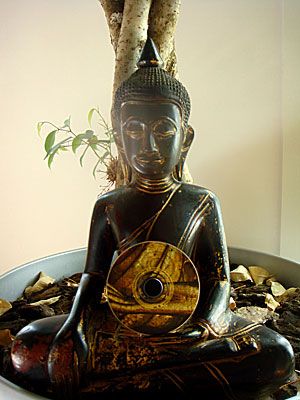 mwe3:
What brought on “Emancipate Your Heart”? It sounds like an
ambient rock gospel overture. Leo’s ‘penultimate’ guitar
solo is great! What is he processing his guitars with on that track? mwe3:
What brought on “Emancipate Your Heart”? It sounds like an
ambient rock gospel overture. Leo’s ‘penultimate’ guitar
solo is great! What is he processing his guitars with on that track?Jan Linton: This song was actually written by Derek Pierce, who is retired now, but he used to record and release under the name of Beat System. He had envisaged it as a kind of blues track but with mutated chords based on a book on Zen guitar, or shamisen, over a drone, as in Beethoven's Ninth Symphony, at least according to him. He is an odd yet deep thinking bloke who apparently went to school with the Stones' Brian Jones in Cheltenham Spa, so I like to fantasize that that is where the blues influence is coming from. As with Leo, this was another two song collaboration I had begun during my MA study years, that needed an album as a home. The second track I did with Derek, a DMaj7 to D minor instrumental drone called "Zen Guitar", remains unreleased. You can see he is quite influenced by Zen, and that appealed to me on some level. As with Leo's "Anemone", I came up with the lyrics and the vocal melody. Derek had had the idea of it being about the old slave trade in Bristol, and I took that but juxtaposed that with a love song about the bonds of love and the obligations of marriage, perhaps a similar theme to Joy Division’s "Love Will Tear Us Apart." Leo's guitar solo was quite eleventh hour and the last thing added to the album. It was actually an outtake for the solo in "Joy", but it has a kind of zany sound to it -through a fuzzbox I think. Leo doesn't tell me exactly what effects he uses, which I thought was better suited to the blues rock feel of "Emancipate Your Heart". I actually play the distorted guitar solo at the very end of that song, but there was a lull before it came in and Leo's fuzz guitar fitted in perfectly. I also play the opening guitars, and Derek played the rhythm guitars throughout; there are a lot of guitars in that song! mwe3: “Anemone” Explain your choice of the song title and the analogies in the song? Jan Linton: "Anemone" is of course an important song as it was the first one I did with Leo's material; he had already released it as an instrumental, and it is his title. My lyrics came from something he told me about a religious girl who was "saving herself", so she became the "immaculate Anemone" in the song, and "she washes over me" is probably a Buddhist or spiritual way of dealing with emotional conflict, being unchanged or unhurt by it, while still embracing it. The line "My ocean life, the sea and sky, these two things are always with me" echoes a lyric on my first CD from the 1990s. It is just saying that these things are constants in life, and perhaps you cannot rely too much on other people or relationships. Happiness comes from elsewhere. 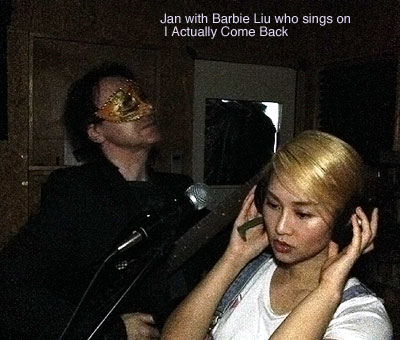 mwe3:
“Birds In The Dream Forest” has some incredible guitars or
are those keyboards before the lyrics come in? What can you tell us
about “Birds In The Dream Forest / Route 2”? That song has
a ‘twilight zone’ effect! mwe3:
“Birds In The Dream Forest” has some incredible guitars or
are those keyboards before the lyrics come in? What can you tell us
about “Birds In The Dream Forest / Route 2”? That song has
a ‘twilight zone’ effect!Jan Linton: While I was trying to come up with more collaborative work while Leo was not available to record new material in 2015, something really magical that happened was when I was listening to "Scene Memory" for further inspiration. "Route 2", which was mainly sparse single notes on a guitar through special effects that Leo uses, when played back at the same time as my old ambient drone piece partly from a cassette, "Bird In The Dream Forest"; the two tracks fitted together perfectly without any editing at all! Even in the some pitch! So I felt that was destiny, and Leo said he liked it too, and fortunately his publisher allowed me to mess with the track in this manner. The lyrics are written partly in Japanese, which I had stopped doing after negative reactions in Japan in the 1990s; I was going against the grain. This is the first time I have returned to recording vocals in Japanese. I feel I have now moved on, and so I can look back at my experiences in Japan with emotional detachment. In fact, I had written "Birds In The Dream Forest" before I had moved to Japan, in any case, so they are pure from any commercial pressure or later, negative experience. They just benefit from my improved Japanese language ability after I lived in Japan for so long. mwe3: How is Matthew’s edit on “I Actually Come Back” unique from the original track? Jan Linton: Matthew was most taken with the song and he even compared it to Marvin Gaye, which I take as a huge compliment as Gaye was a perfectionist singer, although I think the retro/revival TR808 style drum machine makes it have a passing resemblance to Gaye’s “Sexual Healing”. He had already played fretless bass on the track, which took it further in that direction and away from the rather one dimensional synthpop sound my original demo had sounded like. However, he felt it was too long in places and now I agree with him as the intro to “I Actually Come Back” is way too long, and I rather cringe at the vocal harmonies repeating the title several times, yeah, we got it. So Matthew did a more radio friendly edit. If I get a further chance, I might swap the track order around so that his edit is first or second. mwe3: Tell us bout the “Kindness” reprise? The guitar sound is great! You should go deeper! Jan Linton: Leo's use of sustained guitar lines to create this fantastic, otherworldly ambient sound, was what initially attracted me to his music. He had used the same sound on "Anemone". I played harmonica and the overall effect is quite evocative and moving, I feel. Can't you feel? 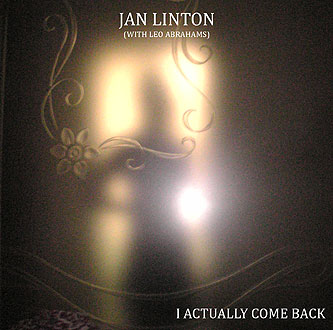 mwe3:
What about your early works including your instrumental recordings on
the Entropy label? Are they out on CD? What kind of chemistry did you
have with China’s Buddha Machine and Matthew Seligman? Some of
I Actually Come Back is rooted in instrumental music. mwe3:
What about your early works including your instrumental recordings on
the Entropy label? Are they out on CD? What kind of chemistry did you
have with China’s Buddha Machine and Matthew Seligman? Some of
I Actually Come Back is rooted in instrumental music. Jan Linton: After the Buddha Machine Music CD, I released the "Sendai" mini album from Entropy records a year later (2012). Matthew had been living in Sendai at the time of the Tohoku earthquake in 2011, and we discussed how we could do something to help, even if it was just a gesture. I had in fact performed an ambient installation at Sendai City Hall's International Culture Centre in the 1990s, but the music had never been properly released. David at Entropy Records wanted to do something for earthquake reconstruction as well, so he agreed to put it out as the second release. So Matthew added beats to one track, and played marvelous fretless bass on the others, really refreshing the material, I think he also added bass synth to one piece as well. The cover was of the yearly Sendai light festival, and we told Sendai City Hall we would contribute the profits of the record to them, but the dark ambient nature of the music may have meant that not many people were interested in it, except experimental dance companies and the like. mwe3: What is Hong Kong like? England was in charge of Hong Kong for many years. I can’t imagine how the Chinese might try to interfere with certain freedoms but do they? Do you have Cannabis rights in Hong Kong? We have it legal in many states but the Republican GOP are trying to stop the will of the voters. Do you have fair elections in Hong Kong? What’s the relations with China like? Jan Linton: Although the hand over agreement was that China was to leave Hong Kong's way of life alone for fifty years, recently it seems that there has been occasional interference, and some opposition politicians  have
recently been banned from taking their seats in parliament because they
swore the oath to China in a jokey manner, or for similar trivial reasons.
On the other hand, I take comfort that Hong Kong still has a British
legal system, often with British judges; a rule of law is something
lacking in China, and even Japan too, though you do not hear much about
this, Japan only recently started a having jury system and previously
had a 99% conviction rate… i.e. if someone went to court they would
always be found guilty! Contracts are in English and if a dispute rises,
English takes precedence over the Chinese version, which is a bit unfair,
but of course I prefer it that way. So, Hong Kong is very international
and amazingly most people get along, in fact you have to make an effort
to do so, as it’s hard to avoid people in such a small city. have
recently been banned from taking their seats in parliament because they
swore the oath to China in a jokey manner, or for similar trivial reasons.
On the other hand, I take comfort that Hong Kong still has a British
legal system, often with British judges; a rule of law is something
lacking in China, and even Japan too, though you do not hear much about
this, Japan only recently started a having jury system and previously
had a 99% conviction rate… i.e. if someone went to court they would
always be found guilty! Contracts are in English and if a dispute rises,
English takes precedence over the Chinese version, which is a bit unfair,
but of course I prefer it that way. So, Hong Kong is very international
and amazingly most people get along, in fact you have to make an effort
to do so, as it’s hard to avoid people in such a small city.I am in Hong Kong because it is a base for touring China and neighboring countries, as the audience in Hong Kong itself can be lacking. Unlike Japan, where everyone professes to like some kind of music, there are quite a few people in Hong Kong who have little or no interest in or knowledge of music. They are too busy studying for a finance degree in the evenings or, as a friend put it comically, "back at home by six pm to slurp soup with granny!" It is stereotyped as financial city, but there are musical experiences to be had if you dig deep and go off the beaten track. I already mentioned Rosealan guitars down the street from me: I found out about that shop from a scrap of paper falling off the wall of a construction site!  mwe3:
What other things keep you busy in Hong Kong and what other plans do
you have for your music during the second half of 2017? I hope there's
more music planned by you! mwe3:
What other things keep you busy in Hong Kong and what other plans do
you have for your music during the second half of 2017? I hope there's
more music planned by you!Jan Linton: I took over a music studio in Hong Kong this May. It had been built by Joe, a drummer I occasionally play with, who had to let it go. So I have been thinking about making it commercially available. It has a sound proofed booth, which ideally suits vocalists who want to record their voice and then have me as a producer or engineer. One of the local singers I know here is working on a Chinese language version demo for a Taiwanese record company. It's one of my older songs from my first CD "Oinaru Sekai" (English title,”Truenirvana”) which was recorded in ten languages, This particular song has already had English, Japanese, and Spanish versions, but I am quite pleased with the lyrics this local singer has come up with for the Chinese version. I am hoping this will do well in the China market. I have several tracks that could be standalone releases, though I am getting more interested in making videos, which I haven't really explored fully, as a means to promote music. I feel if I had more music videos, my music would probably be better known. Thanks very much for interviewing me!
|
|
|||
|
||||
